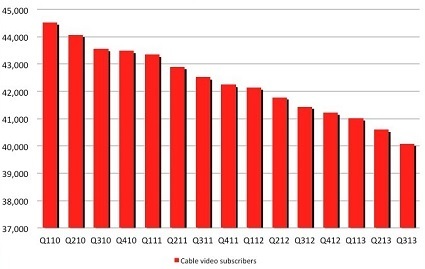6 Famous Companies You Had No Clue Were Dying
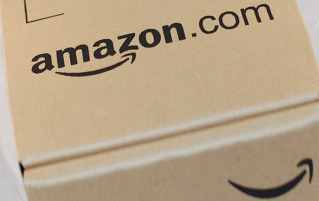
At first glance, some businesses seem completely bulletproof. They've been super successful just short of forever and have made enough money to gas up the average SUV at least twice, so it's ridiculous to think their fate is anything but "keep making money until Galactus turns our planet into poop."
But the truth is, every business eventually is sent to live at the sunny Business Farm upstate, with the cows and the chickens and all your childhood pets. This includes companies that millions upon millions of people still pay attention to. And just because they seem healthy on the outside doesn't mean they aren't decaying into an atrophied, gangrenous lump on the inside ...
Fast Food And Casual Dining Is Grasping At Straws

Many of our favorite restaurants -- both casual dining and fast food -- are in grave danger of being forced onto an all-liquidation diet. Their crimes: being too expensive, too unhealthy, or too uncool. The worst offenders are all three.
Take Red Lobster, sold by their owner last year after sales dropped nearly 9 percent and visits dropped 19 percent, in a single quarter. Or Olive Garden, whose recent drops are less severe (5.5 percent sales drop with 13 percent less traffic) but equally alarming. In a world where nobody has money, fewer and fewer want to plunk down $15 to $20 on a plate of spaghetti or trout they could easily prepare themselves without a gaggle of stoned teenagers as the middleman.
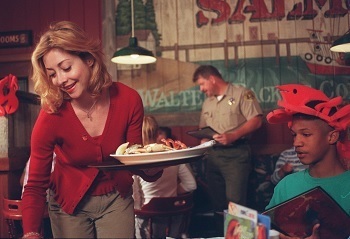
Furthermore, these restaurants boast slow service (a crime akin to murder in today's fast-paced world) and suffer the stink of looking exactly as they did 20 or 30 years ago. They're out-of-touch, old eateries for out-of-touch, old eaters. Not even sandwiches made out of breadsticks can save a company that, fair or not, the hip kids of modernity have officially dubbed "neither the cat's pajamas nor the bee's knees."
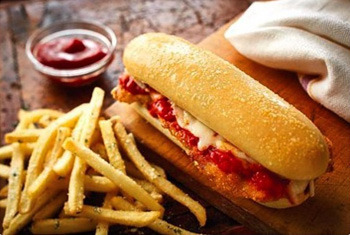
Then there's Quiznos and Sbarro. Both are hundreds of millions of dollars in debt, thanks largely to a growing reputation of not being nearly as healthy as ostensibly figure-friendly eateries like Panera Bread and Chipotle. Both have filed for bankruptcy -- in fact, this is Sbarro's second filing this decade alone. On the bright side, this gives Sbarro two punches on their Bankruptcy Court VIP card. Eight more and they get one filing absolutely free.
Finally, there's good ol' McDonald's. This January, they decided what they really needed was to take a giant shit all over health food. So they filmed a commercial where they insisted they would never sell out with disgusting, hipster swill like soy, Greek yogurt, or, Grimace forbid, kale.
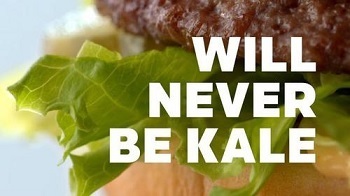
Four months later, McDonald's introduced kale. Of course they did -- misguided principles are the first to go when your business is fucking dying. Sales have dropped significantly over the past couple years, leading to the closing of over 350 stores, in addition to that sheepish attempt to win back millennials with devil-kale. Unfortunately, the rest of their menu is still some of the worst food possible health-wise, and when combined with the brick-and-mortar manifestation of a cheesy uncle who thinks he's "with it" because he knows what hashtags are, you can see why Ronald might be grilling up flatbreads at Panera sooner rather than later.
Hip Clothing Stores Are Ass Now

As our fireside restaurant chat proved, it's good business to consider the wants and needs of young people. And now for the shitstorm that occurs when that's all you think about.
There's a clothing massacre going on at your local mall. All those hip, trendy fashion shops that were the places to be for young, gorgeous people dumb enough to wear a shirt featuring the name of the store they bought it from like a good little billboard -- are in gigantic trouble. Very soon, there'll be a lot of empty space at that mall you haven't visited in 10 years. It'll look good next to the empty space that's already there.
American Eagle Outfitters, for one, plans to close down 150 stores over the next three years. After years of declining sales, it's nice of them to leave a window open in case customers suddenly change their minds. Aeropostale, meanwhile, isn't nearly as patient. They've thrown in the towel so hard they shut down stores during the holiday season -- the one time people actually pay attention to the mall, and they can't even make money then.
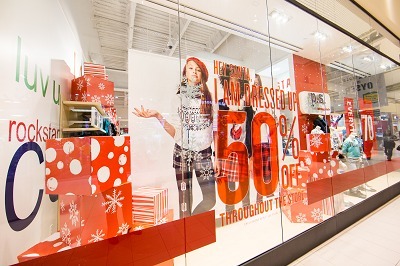
American Apparel, meanwhile, lost $19 million in one quarter last year, due to both poor sales and spending mountains of money to oust CEO Dov Charney, who just couldn't quit masturbating in front of women and taking his pants off during meetings long enough to actually run his company. Shit sales and batshit leaders are rarely a winning combination, it turns out.

And what of the big one, Abercrombie & Fitch? Apparently being name-checked by one putrid song only drives sales for about a decade, because their bottom line is bottoming out. Stocks are half of what they were a year ago, and at least 60 stores are on the chopping block. It certainly doesn't help that longtime CEO Mike Jeffries, who retired just a few months ago, once publicly stated he wanted to market only to "cool, good-looking people."

Each of these companies, even the ones with sane management, suffered the same problem: They catered to a young, trendy audience but didn't grow with the times. They assumed that, just because Generation Y enjoyed advertising "A&F" or "AM Eagle" all over their hoodies, Generation Z would as well. That simply isn't the case, as Generation Z has their own trendy stores -- Forever 21, Zara, H&M, and others that just "get it." But this'll last only until Generation Now-I-Know-My-ABCs comes of age and starts shopping at Zorbo's and Doodledong's and Crazy Ezekiel's Tunic Outlet.
BlackBerry Is Dying A Loud And Undignified Death

Way back in your grandpappy's day (2003), BlackBerry all but invented the smartphone. Then, Apple came along and built a better one, challenging BlackBerry to become more than just a glorified email machine for millennial yuppies. Well, since the company's still around, they must have weathered this stiff competition pretty well, right?
Yeah, about that -- BlackBerry's not just unhip; it's fucking dying. Three years ago, the company was worth over $5 billion. Since then, sales have freefallen, starting in 2012 with a 43 percent drop, in one quarter. Since then, they've somewhat slowed the bleeding, with sales down only 32 percent year over year. It's like how a cadaver decays less after it loses virtually all of its flesh.
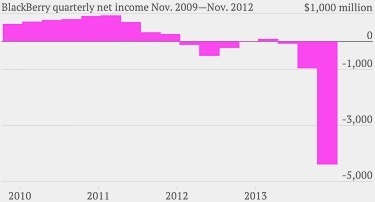
But rather than retire to a rocking chair and wistfully recall the good old days of being relevant, BlackBerry is raging against the dying of the trackball. They're desperately innovating, a fine idea they probably should've thought of six or seven years ago. Of course, company-saving innovations still have to be good, unlike this ... thing:
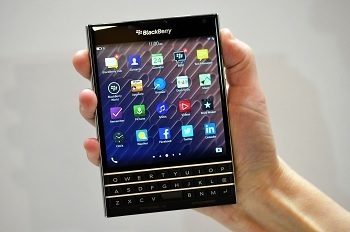
Meet the BlackBerry Passport -- basically a normal phone that quit working out and started scarfing three dozen donuts a day. Despite a design too clunky for anyone but the Incredible Hulk, BlackBerry insists it's a good idea that consumers love. They know this not from reading silly old sales figures but from Amazon reviews, many of which rate the product five stars. And the company is just pleased as punch about this. So fret not, Internet commenters: The world might not give a fuck what you say, but at least BlackBerry does.
Not content with mere denial, BlackBerry has already tackled the next stage of grief: bargaining. This past January, CEO John Chen penned an open letter to the Senate, letting them know his feelings on Net Neutrality. Good news: He's for it! Bad news: He has no idea what it is! According to the man himself:
Neutrality must be mandated at the application and content layer if we truly want a free, open, and non-discriminatory Internet. All wireless broadband customers must have the ability to access any lawful applications and content they choose, and applications/content providers must be prohibited from discriminating based on the customer's mobile operating system.

In short, Chen's pissed that BlackBerry users can't access popular apps like the cool kids, and he wants the government to force Apple, Netflix, Android, and others to let anybody use their stuff, no matter what shitty, outdated software they want to use it on.
Music Sites Like Spotify And Shazam Haven't Made Money In Forever
Unless you're an untouchable megastar or an unscrupulous label executive, it's all but impossible to make money in music anymore. And guess what? That rule applies to your favorite music websites too.
We've already mentioned that your favorite streaming site is a musician's wallet's nightmare, but it turns out it's actually terrible for everybody ... except for the consumer listening for free, of course. Spotify and Pandora, the two most popular streaming websites, have never made money. EVER. Their revenue's certainly high -- Spotify, for example, brought in $1.3 billion in 2014, 45 percent more than it did in 2013. And yet, 2014 saw losses of $197 million, three times as much as they pissed away in 2013. Their total losses from launch until 2013: $200 million. They doubled up on red in one goddamn year.
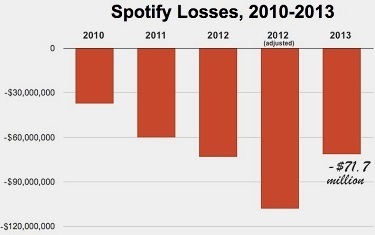
Meanwhile, Pandora's valued at $5 billion and has as much to show for it as a broke college freshman. Because the more money these companies pull in, the more money they have to fork over. Between royalties and licensing/distribution fees, just short of 100 percent of their revenue goes anywhere but their savings account. Plus, they're hiring more than ever (since bigger sites need more hands to run them), which pushes them straight into the negative. And as they grow more popular (which, unless the public suddenly tires of free music, is guaranteed to happen), they'll bleed even more money, until the people in charge pull the plug and force us all back onto terrestrial radio like a bunch of cave-dwellers.
Still cool with blowing Blue Ivy's college money on Tidal, Jay-Z? Considering the massive, money-losing flop it's already been, probably not.
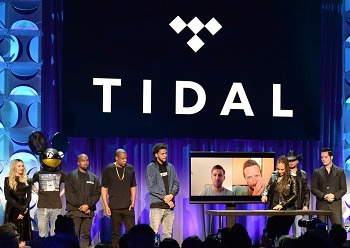
But it's not just streaming music that's drying up. Shazam, which tells you what song you're listening to (for when Googling "doo doo doodoodoo doo doo DOOOOO" turns up nothing but scat porn), hasn't turned a profit since 2006. This despite sporting 100 million users and being worth over $1 billion. Once again, the occasional ad isn't enough nutrition to keep a business from starving to death.
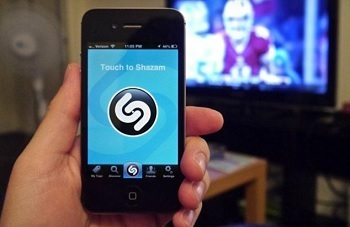
Maybe if Shazam went back to its pre-app model of charging people a buck per search, they'd finally crawl back into the black. Otherwise, we foresee a future of nobody profiting off of Shazam except maybe The Rock.
Amazon Has Never Made Money

Yes, that Amazon. One of the most popular websites on the fucking planet. A site you've almost certainly used before, if only to procure some of that sweet, sweet dino porn that stodgy-ass Barnes & Noble refuses to stock. That company's not making money.

Worse, they've never made money, period. Amazon.com is literally a born loser.
Since their launch in 1994, Amazon has struggled to break even, with barely a decent uptick on Wall Street. But CEO Jeff Bezos is a forward-thinker, eschewing such bourgeois standards of success as "good stocks" and "earnings" in favor of shit like "profitless prosperity." This is a buzz-wordy way of being cool with not making money in the short term, because they'll surely be swimming in it once this whole online delivery thing finally takes off.
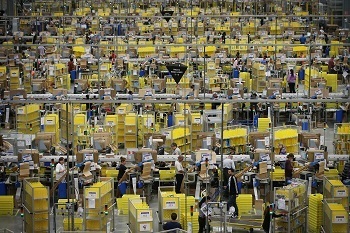
Exhibit B for Amazon: their "free cash flow," which currently sits at $2 billion a year. That sounds downright impressive, until you realize what free cash flow is: paying people on time. And that's all! Customers pay Amazon, Amazon pays their suppliers, and everybody's happy. You might recognize this circle of dead presidents as Decent Business 101. Amazon, on the other hand, sees it as irrefutable proof that they're successful as fuck.
Except they're not successful. The whole point of business is to make money and keep it -- Amazon's mastered the former, but shits the bed with the latter. They make gobs of sales ($89 billion in 2014 alone), but expenses eat most of that up. When they get real bored, they spend yet more money on stillborn ideas like the Fire smartphone, or money-sucking ideas like free shipping and Amazon Prime, aka freer shipping.
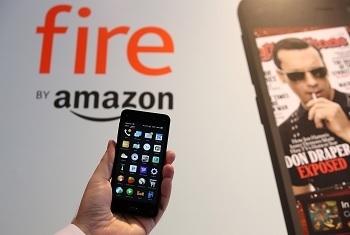
And it looks like the company's profitless prosperity has finally quit prospering. Last October, their normally stagnant stock plummeted 20 percent, resulting in a gargantuan $437 million loss for the year -- 10 times the loss they suffered the year before. This past January, they reported another major loss, this time $241 million. Friendly reminder: They made $89 billion last year.
For now, Bezos insists everything is fine, but how many believe him? His stockholders, in particular, are mighty pissed that Amazon has finally been exposed as little more than a glorified charity that benefits only the consumer. Oh, and Bezos, who's currently worth $38 billion.
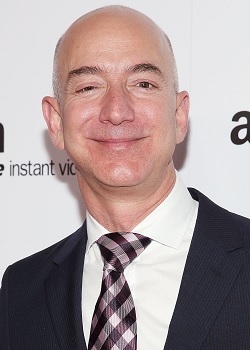
Internet Companies Are Slowly Killing Cable

Finally, we have not a dying business but an entire dying industry: Cable TV is rapidly learning, the hard way, that it has no place in the Daffy Duck push-button home of the future.
The latest numbers forecast an ugly future for Big Cord. During first-quarter 2015, almost 180,000 people canceled their pay-TV subscriptions. In all, between 30,000 and 40,000 fewer people flip channels now than they did during the last Christmas Story marathon. That's bad enough alone, but the first quarter's traditionally known for very strong sales, which makes this news suddenly way worse.
As for Internet subscriptions, they're strong as ever and getting stronger all the time. Comcast recently reported having more Internet subscriptions than video ones, for the first time ever. Trust us, it will not be the only time, as customers are clearly fed up with paying sky-high prices for a thousand channels, especially when only one of them has Game Of Thrones. And since you can easily watch the Tyrion, Death, And Dragons Variety Fun Hour online (legally, you cheap bastards), along with virtually any other show, the idea of a whole package of channels has simply become unappealing.
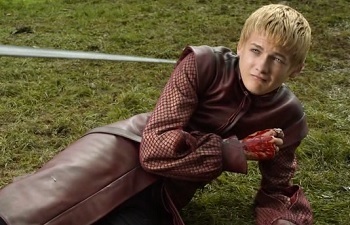
Speaking of unappealing, let's talk horrid customer service -- a sad bastion of cable that should prove harder to get away with now that everyone's online and free to expose terrible work to their little hearts' desires. Like, Comcast upped earnings by 10 percent last quarter, thanks mainly to their Internet wing. But if they want to keep their now-very-loud customers happy, they'll need to improve on the little things, like treating people humanely.
Their current fix involves hiring 5,500 customer service reps and hundreds more service techs, along with re-training current workers on how not to be sociopathic assholes. Though they should probably also shelve their "everyone's a salesperson" gimmick if they truly want to make customers happy and keep them that way.
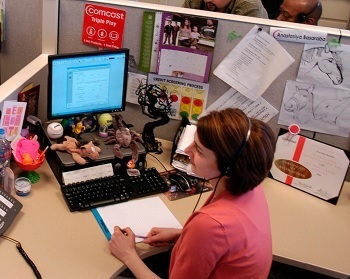
Or they could simply withhold refunds in exchange for vows of silence, as they've done in the past. Wait, not in the past -- they just fucking did that. A customer forced to pay $600 in late fees for a cable box he returned in 2010 received a non-disclosure agreement from Comcast, which essentially said, "You can have your stupid $600, but only if you agree never, ever to sue or even complain about our stealing your money."
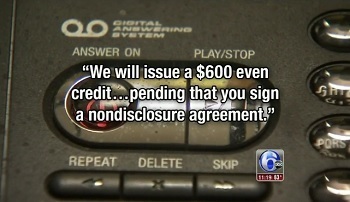
Yeah, he didn't sign. Instead, he immediately complained to the news, who immediately posted it online. Coincidentally, Comcast issued the refund, also immediately.
One of these two approaches might keep irate customers from drowning your soon-to-be-cable-less company in social media outrage. The other definitely will not, and it will definitely bleed your bottom line faster than it already is. Choose wisely.
Jason listened to Pandora for free while writing this, because he is just the worst. Disagree over Facebook and Twitter so he feels better about himself.
Be sure to follow us on Facebook and YouTube, where you can catch all our video content such as How To Succeed In Business Without Really Dying and other videos you won't see on the site!
Also check out 6 Vintage Ads Companies Would Never Get Away With Today and 5 Spectacularly Crazy Meltdowns By CEOs Of Major Companies.


